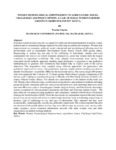WOMEN TECHNOLOGICAL EMPOWERMENT IN AGRICULTURE: ISSUES, CHALLENGES AND POLICY OPTION: A CASE OF RURAL WOMEN FARMERS GROUPS IN NJORO SUB-COUNTY KENYA
Abstract
In Kenya women in rural areas are key agents for achieving the transformational economic, social, political and environmental changes required for achieving sustainable development. Women lack empowerment on economic, political, social, educational and psychological affecting most for development such as Sustainable Development Goals, Kenya Vision 2030 among others. Empowering is women key not only to the well-being of individuals, families and rural communities but also to the overall economic productivity, given that women form the largest workforce in agriculture worldwide. The study adopted cross-sectional study survey with concurrent mixed methods approach entailing equal preference to quantitative and qualitative methodologies to generate rich information that helped fully to explore each of the survey objectives. The respondents were sampled using different approaches for quantitative and qualitative aspects of the survey. For quantitative segment, simple random sampling was done to identify beneficiaries’ households (HHs) for the household survey. The survey target 240 farmers who were organized into 2 clusters of 12 farmer groups (Each cluster 6 groups) comprising of 20 farmers each working as a production group in Mauche and Mau-Narok divisions in Njoro subcounty, Nakuru County, Kenya. The sample size representative of the farmers in this study was 148. Primary data collected using a combination of quantitative and qualitative methods including group discussion, structured interview, semi-structured interview, Key informant Interviews (KII) and some PRA tools such as Venn diagram, Gender Analysis Matrix, and Time Trends. Secondary sources comprised of relevant project documents and State and Non-state partner reports. The data collected was analyzed using qualitative and quantitative methods with the help of Statistical Package for Social Science (SPSS). From the data results the respondents reported that they lacked power over, power within and power to control major decisions such as marketing, major crops to produce, type of technology to use, and type of information. They reported that they were economically, technologically, socially and politically empowered. The women reported that after introduction of the mobile phone services they were able to open an account, save, access credit, make payments, access extension information, network with other women, men and other organization on modern farming methods.

